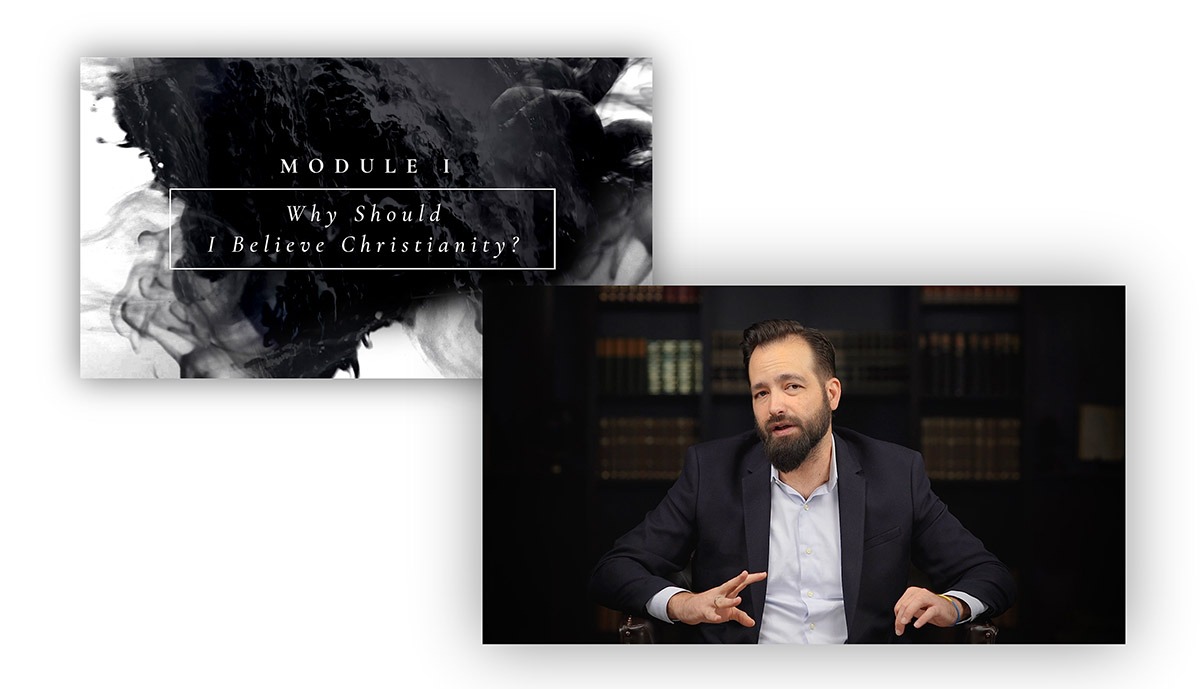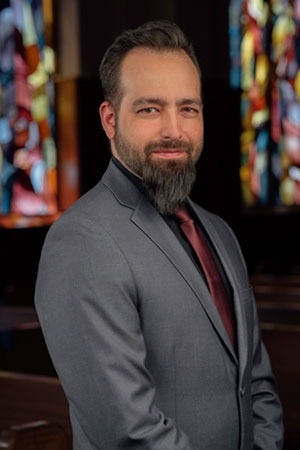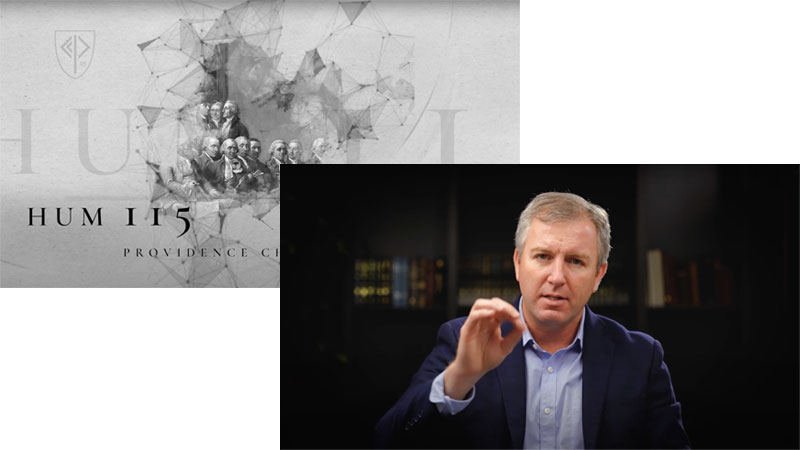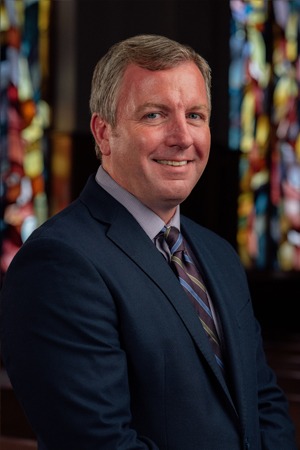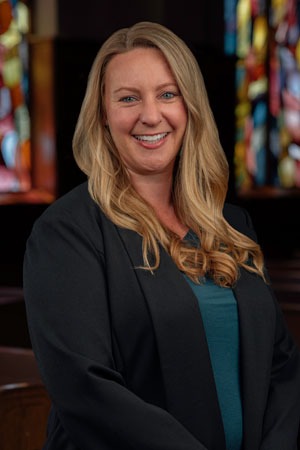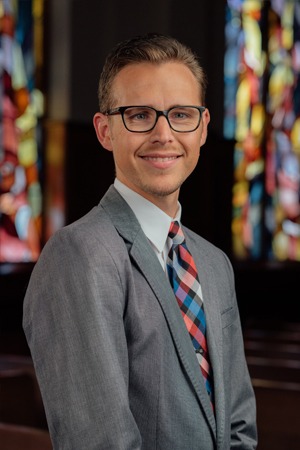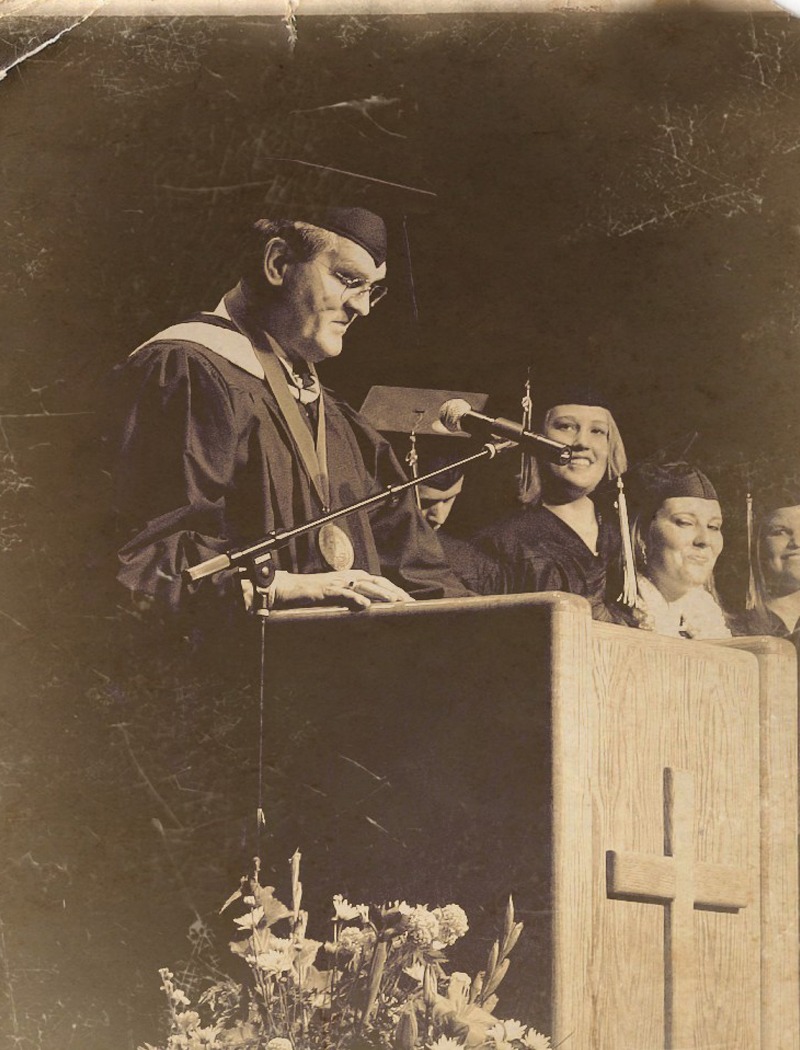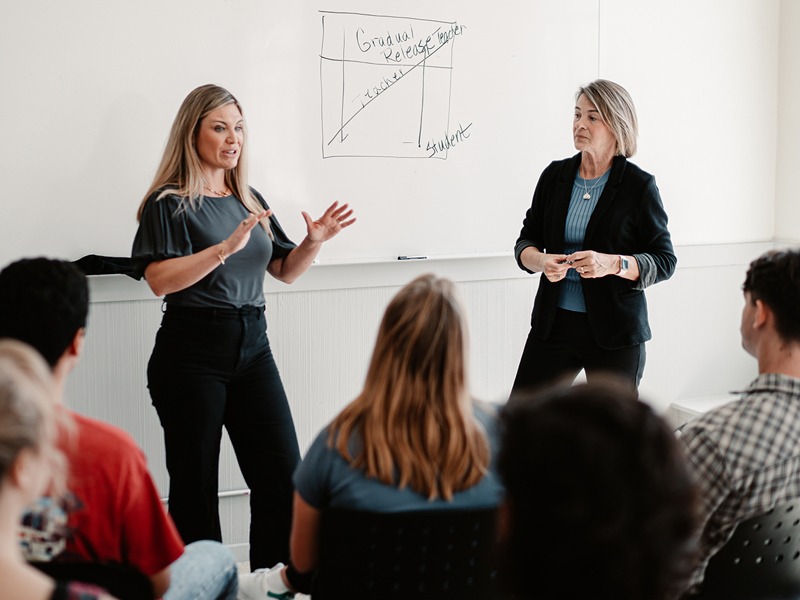The following story was featured in the Fall 2022 Providence Magazine. CLICK HERE to read the full magazine.
By Shelli Lundgren ‘13
Providence’s students aren’t the only ones returning to the classroom this fall. Around the world, Providence graduates are furthering the college’s mission as redemptive educators, engaging culture, and reaching student’s hearts with a Reformed, biblical worldview in their respective corners of God’s kingdom.
By the Numbers – Providence’s Mission in Action
Though it is a young institution, from its very beginning Providence Christian College has been making an impact on the world through education. From the first teacher produced in the first graduating class of 2009 (still teaching her own children a decade later) to now, Providence has sent over 60 students from the Education concentration out into the world. At least 50 of these are still actively teaching in classrooms across the country and around the world. Significantly, this means that 25% of the total graduates from the college either studied education directly, or their studies in other areas equipped them for teaching positions. These graduates serve as far afield as China, and as close as down the street in Pasadena, California. In at least four countries and eight different states, these Providence alumni are putting the mission of the college into action, demonstrating the best of what Reformed Christian education has to offer. They are changing hearts and minds for Christ and teaching students to analyze culture from a biblical lens. They are helping students find their gifts, and providing them with a foundation to go out into the world to glorify God. They are helping students find meaning in every square inch of the creation. Each of these educators were uniquely prepared for their positions by Providence’s world-class educational program.
A Counter-Cultural Program
So why is the Education department at Providence producing such impressive results and such high numbers, when nationally, education is trending in the opposite direction? Traditionally, 40% of students enrolling in colleges or state universities were pursuing education degrees, but now that number is closer to 10% on average. While Providence is not completely exempt from the trends away from education, there is one factor that makes a big difference: Education 101 is part of the core curriculum. Professor Jan Van Spronsen explains, “The benefit of having it in the core at Providence is that many get to discover it, or consider for the first time after being here, whether it might be their calling after all.” She is able to point to several students who came to Providence to pursue different areas of study, but after taking EDU 101, they realized their giftings in that area, and decided to follow a different path after graduation. Students also realize that education is a field that offers an especially meaningful career option post-graduation. “It is an attractive concentration because it offers such a clear path of service to God and to others,” reflects Professor Julie Bykerk.
Success Stories
There are certainly many Providence alumni who followed that path of service, and many of them are eager to share how their education at Providence prepared them and led them to their current classroom ministries. Sam Fennema (2019) is one student who found his calling during Education 101. He cites the way Professor Van Spronsen connects faith and work, and states, “For the first time, I was able to see that I had skills and could contribute. Her classes taught me more than what education was, but that I had the skills to be an educator.” He goes on to explain how this affected him when he says, “She didn’t just teach me the theory of teaching, but my identity as a teacher. This still stands as one of the greatest gifts I have ever received.” Fennema says Van Spronsen modeled how a Christian can live a life that was designed by God with a clear purpose, and how to seek that out through teaching and relationship. He recounts, “Only in that combination could I have found education as a ‘calling’ instead of a ‘job’.” By the time he graduated, his mind was made up to follow this calling to the other side of the world, as he currently serves God in a classroom in China, while simultaneously seeking his graduate degree from Covenant Christian College.
Back in the states, Providence’s biblical perspective on teaching continues to carry influence. Jolene (Ybema) Westendorp (2016), spent six years teaching in 4th-8th grade classrooms in Michigan. Now at home with her family, Westendorp feels that her preparation at Providence has affected her life not only in the classroom, but in other ways as well. She explains, “If there’s anything I’ve learned as a teacher it’s that everything is always changing. In education, you need to roll with the punches and be flexible.” She continues, “Providence prepared me well to be flexible by inspiring me to be a lifelong learner…to continue to learn how to best teach the students the Lord has providentially placed in my classroom. This skill will continue to assist me as I raise and train my daughter.”
Shelli (Cammenga) Lundgren (2013) is equally grateful for the preparation she received at Providence. Now in her tenth year teaching English in a secondary classroom in Escondido, California, Lundgren credits her time at Providence as equipping her for the variety of roles she has been able to fulfill. She states, “Because we were able to be involved in so many different parts of the Providence community, I was prepared for the wide range of skills needed at the school God called me to…” She goes on to explain, “I was not only able to teach, but direct drama productions, design the school yearbook, help with student events… all things that made a difference to many students.” Providence was a vital part of her training for her vocation, and she says with confidence, “I never could have had such a variety of experiences elsewhere; I have no question that God provided exactly what I needed through my Providence preparation.”
The exponential difference made by the early alumni of Providence continues to be felt as they impact the next generations of students. Jamie Tyler (2011) has been teaching in Arizona for many years in kindergarten and 3rd grade classrooms, and says that she still uses the things she received at Providence. She states, “I learned to integrate the gospel into my lessons, shepherd the children in my classroom, and pray for my kids and their families everyday. I’m so thankful for my schooling. It’s the reason I’m doing what feels like the most rewarding job in the world!”
A Rich Tradition
From the beginning, God shaped the success of the education concentration at Providence through the professors and opportunities He provided, creating something that has already served His kingdom and will continue to have a ripple effect on generations to come. Even before students were on the first campus in Ontario, California, Dr. Steve Krotenhoeven and Dr. Lynn Hoekstra had answered God’s call to their “next new thing” and they were hard at work forming plans for how Providence would approach educating educators.
Dr. Kortenhoeven had found his way to the project through his interest in Reformed higher Christian education and through his relationship to Jim Den Ouden, the college’s first president (and Kortenhoeven’s first principal). Dr. Hoekstra found her way to Providence through her husband Jack’s role in the early development of the school. Together, Kortenhoeven and Hoekstra set high goals for the vision of the program, emphasizing the imperative balance of philosophy and practice. As Kortenhoeven explains, “From the first class we wanted students in classrooms, doing observations and really exploring the good work teachers are doing in the community.” He also spoke of one of their distinctive goals: they wanted to do justice to the rich history and contributions of Reformed thinkers and philosophers in Christian education as part of their foundation of learning. Though graduates would leave prepared to teach wherever God sent them, Dr. Hoekstra emphasized the desire that the graduates would truly teach Christianly in every aspect, from how they developed curriculum, to their methods of pedagogy, to their personality in the classroom. She states, “It’s who we are as believers that needs to make a difference in students’ lives.”
It was a hard road to make this dream a reality, and took the special gift of being able to see challenges as opportunities to build from the ground up. Both Kortenhoeven and Hoekstra recalled the difficulties in being an unknown entity, introducing themselves to schools in the area and negotiating to get students into the classroom, but God has his hand on them from the beginning. “The size helped,” Dr. Hoekstra remembers. “We could take field trips and get a class into a classroom because we weren’t too big yet.” Another blessing of the small size was the opportunity they had to build personal relationships with the students and truly mentor them. Dr. Hoekstra explains, “They’d come back from their day teaching, and we could talk about it and work it out in real time.” The results were worth it. Dr. Kortenhoeven fondly recalls, “The best part was seeing students in classrooms light up and envision themselves as teachers in the future.” From the beginning, they found the benefits of being a small school and capitalized on them, as Providence continues to do to this day. Despite the challenges posed by the college’s initial move to Pasadena, by their respective doctoral work, and the demands of making an indelible mark on the lives of hundreds or students, they still have fond memories of this time. “When you are fulfilling God’s call in your life, it puts it all in perspective,” explains Dr. Hoekstra. She notes that she has stayed in touch with many Providence alumni from this period, and says, “Providence connections are special…they last!”
Eventually, God called both Korthenhoeven and Hoekstra to their “next things” once again. Dr. Korthenhoeven became principal of Denver Christian School, and Dr. Hoekstra became the director of the undergraduate teacher education program at Columbia International University. But even as things were changing, God had prepared the way for the program to continue to move forward.
Professor Julie Bykerk was already established as an adjunct professor and was Student Teaching Supervisor, while simultaneously teaching at Ontario Christian School. She was joined by Professor Jan Van Spronsen, who had also been teaching as an adjunct professor and contributed a wealth of history and experience. Together, they helped Providence move to a new location within Pasadena, and helped to mold the Education major into the EDU concentration, according to Providence’s liberal arts model. Van Spronsen cherished the opportunity to grow the program she inherited. “What I loved about the program that was established when I came was it did not create pedagogs, but thinking educators who really considered and understood what it was to teach a human person created in the image of God.” She goes on to say, “The Reformed perspective is so helpful in its ability to help us educate people as God created them, and approach them as God would.” Professor Bykerk agrees that the early design of the program was a treasure trove. She says of the existing classes, “They were clearly designed to equip our students to teach from a distinctly Christian perspective. The bones, the structure and the purpose of the education program have remained the same over the years.”
From this foundation, Van Spronsen and Bykerk continued to work and refine the course offerings at Providence, finally increasing the number of methodology courses offered and fleshing out the Technology in Education, Current Issues in Education, Student Diversity, and Teaching of Reading courses. The final course offerings are designed to facilitate the credentialing process for students, while maintaining a distinctly Reformed and Christian perspective. They also determined it was crucial to retain their distinctive 120 hours of in-school internships. “It’s an incredible asset,” Van Spronsen says of the amount of time Providence students spend in real classrooms with real teachers. “They put the theory to the test. They are not just academics, they apply!” Providence also continues to make student teaching available at the undergraduate level based on the incredible testimonials from the students who benefitted from it, whether they went into fifth year programs, master’s degree programs, or directly into the classroom upon graduation. As the result of years of research and development, Van Spronsen says of the concentration, “It’s a strong list of courses, and I’d put it against any program.”
The feedback for the current concentration has been overwhelmingly positive. Van Spronsen testifies, “Our graduates feel over-prepared for the masters programs.” Those who have sought a California credential have found they already have much of the knowledge they need to succeed, even though the original design of the program does not require credentialing in an effort to open more opportunities. Regarding the original emphasis, Kortenhoeven explains, “We are not beholden to the restrictions of the 5th year program; it’s freeing. It lets us stay true to mission and shape the curriculum with the right perspective.” While they hope to someday offer a Christ-centered credentialing program, Providence students are in no way held back from a myriad of callings. Bykerk raves, “I love hearing the continuous stories of teachers making an impact, and graduates excelling in their credentialing and master’s programs.” Many students go directly into teaching in schools overseas or schools that do not require a credential. Others pursue further education or gain their credential while under contract. Van Spronsen says, “We open doors to as many possibilities as we can. Providence provides the roots and core for wherever God takes our graduates.”
Answering the Call
God has brought the dream of bringing highly qualified Christian teachers to the West Coast to fruition in ways Providence’s founders could only have dreamed of. Over time, the emphasis has not changed. “There is not a single class where the thinking and integration of biblical thought is not at the core of what we are doing, and I think that makes it a very strong program,” Van Spronsen explains. “We want graduates to leave with the skills they need for classroom management, engagement, assessment… but if they can’t think clearly about the role of education and their roles as teachers in education, none of that other stuff matters.” She goes on to say, “As a principal, I had many teachers come in not thinking as Christian teachers; had I hired students from Providence, I would not have had this issue.”
Other principals have echoed this sentiment. Though it is still a relatively young institution, Providence has already developed a reputation for producing excellent educators. “As a school, we are on the lookout for Providence Students,” says David Illman. “By employing their graduates, Calvin Christian School has greatly benefitted from the education that Providence Christian College provides. I am thoroughly impressed by how Providence equips their students with biblical truth, an enthusiasm for God’s world, and a love of learning that naturally permeates through our whole faculty and student culture.” Illman is not alone in his appreciation for Providence graduates. Dave Vander Meer, former principal of Reformed Heritage Christian School, also looks to Providence in the hiring process: “I have had the privilege of hiring multiple graduates of Providence Christian College. They have been well-grounded in how to think biblically, and well-rounded that they could adapt to teaching many subjects. My experience with Providence graduates has been positive, and I would recommend that employers seek them out.”
The Call Continues
The field of education has had its fair share of headlines lately, from the national teacher shortage, to what topics should be taught in the classroom, and even whether or not schools should ban books. It is clear that this is an area deeply in need of what Providence has to offer. The need for excellent educators is a call raised across the board: by public schools, by parents who are considering homeschooling, by private or charter schools seeking to increase opportunities for school choice, and by Christian school administrators prayerfully trying to fill the positions they need in order to minister to their unique communities in the coming years.
For the Christian, the form and nature of education is especially close to home, continuing in the footsteps of the Reformers who believed it paramount to train believers to read the Bible for themselves apart from outside influences and use it as the solid foundation to sift through the chaos of every new ideology. Providence not only produces graduates who can walk across the stage fully grounded in God’s word, but are also able to fearlessly engage society and be a vessel of God’s redemptive work. The educational field is at the heart of the fight for understanding of how the world works, who we are, and why we are here.
We thank God for the work He has done and continues to do, using this small Reformed college on the West Coast to answer the enormous call to meet the deep needs of those desiring to raise the next generation of thoughtful believers well, and to make an eternal difference.
